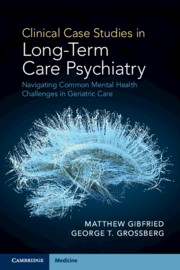 Clinical Case Studies in Long-Term Care Psychiatry
Clinical Case Studies in Long-Term Care Psychiatry SSRIs/SNRIs and Bleeding Risk
Published online by Cambridge University Press: 31 October 2024
Antidepressants, when used appropriately and in combination with an individualized psychosocial approach, can dramatically improve depressive symptoms and the quality of life of residents who have major depressive disorder. The selection of antidepressants needs to take into account the patient’s medical problems, as well as what side effects one wants or wants to avoid for a particular patient. There is no compelling evidence that one antidepressant works better than any other for the treatment of majpr depressive disorder in long-term care populations. Selective serotonin reuptake inhibitors (SSRIs) are probably the most commonly selected first-line medications for the treatment of major depressive disorders in long-term care residents. Serotonin-norepinephrine reuptake inhibitors) have also been associated with a potentially increased risk of bleeding, although the risk appears to be lower compared to SSRIs.
To save this book to your Kindle, first ensure [email protected] is added to your Approved Personal Document E-mail List under your Personal Document Settings on the Manage Your Content and Devices page of your Amazon account. Then enter the ‘name’ part of your Kindle email address below. Find out more about saving to your Kindle.
Note you can select to save to either the @free.kindle.com or @kindle.com variations. ‘@free.kindle.com’ emails are free but can only be saved to your device when it is connected to wi-fi. ‘@kindle.com’ emails can be delivered even when you are not connected to wi-fi, but note that service fees apply.
Find out more about the Kindle Personal Document Service.
To save content items to your account, please confirm that you agree to abide by our usage policies. If this is the first time you use this feature, you will be asked to authorise Cambridge Core to connect with your account. Find out more about saving content to Dropbox.
To save content items to your account, please confirm that you agree to abide by our usage policies. If this is the first time you use this feature, you will be asked to authorise Cambridge Core to connect with your account. Find out more about saving content to Google Drive.